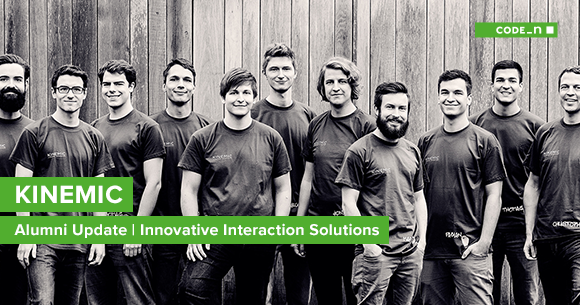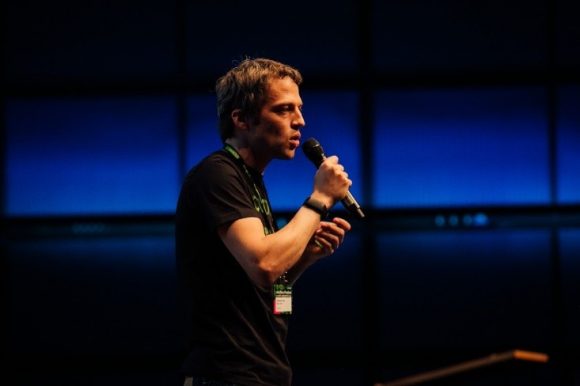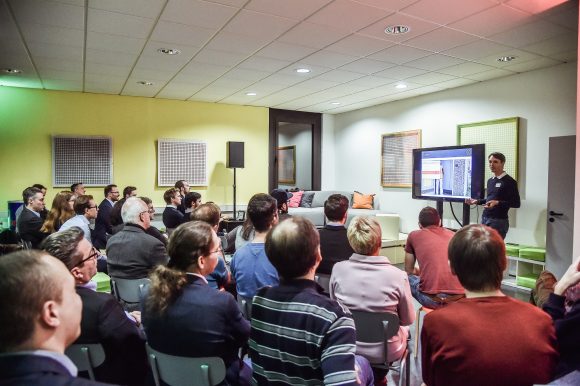"I feel that in 2018 many doors will open to us in step with increasing industry adaptation" Dr. Christoph Amma, Kinemic
We love spontaneous alumni catch ups! We recently ran into a familiar face in the halls of CODE_n SPACES: Dr. Christoph Amma, co-founder of Kinemic, honored us with his visit to the innovation campus during an event. Already as a finalist of the CODE_n CONTEST 2016, Kinemic enthralled us and the jury with the technology it has developed for gesture recognition and its diverse use cases in industry. Of course, we took advantage of this spontaneous encounter to get an update and spoke with Christoph about the development activities of his startup. Christoph, who personally invented the concept of air writing – the basis for the innovative gesture recognition software – talks to us about a range of topics, including how augmented reality is now gradually gaining acceptance in small and medium-sized companies and about what all exciting things have been happening at Kinemic in the past year.

Picture credit: Kinemic
Lisa: Hi Christoph, how nice to see you here once again at SPACES! We are always happy to take this opportunity to get an alumni update. In a nutshell for our readers, what does Kinemic do?
Christoph: Kinemic develops software solutions for gesture recognition in industrial applications. For this purpose, we use wearables to facilitate interaction with all kinds of computing devices. A practical application in industry consists of the gesture-controlled, intuitive operation of augmented reality goggles or head-mounted displays. By using their software, your hands stay free to operate tools or perform other tasks.
Lisa: Are there already specific usage scenarios?
Christoph: A few use cases have now taken shape which are drawing a great deal of interest. This includes the operation of smart glasses or virtual reality head-mounted displays. Just this year, the next generations of these head-mounted displays have been released by manufacturers, and they are not only easier to use but have more power, allowing our software to be run directly on them. For us, this means that beyond voice recognition, we can offer another intuitive way for handsfree control of such devices.
Lisa: So there’s quite a bit in the works?
Christoph: Yes, there’s a lot currently under development, including for us. Small and medium-size companies are now gradually beginning to tackle the topic of augmented reality head-mounted displays and major companies have been focusing their attention on these topics for quite a while now. The general consensus has been that while it’s wonderful to have a display in your field of vision, you must also be able to operate it. For now, the possibilities for controlling the latest augmented reality head-mounted displays are still quite cumbersome.
Lisa: Do you have competitors?
Christoph: Not very many. Sifting through the Internet, you will encounter similar offers from Israel, Canada, England, and the USA. Some of these startups may have fancier websites than our own, but most of them do not offer more than announcements, nor are they suitable for industrial use.
Lisa: How is your system already being used in industry?
Christoph: Our product is being employed in various pilot projects in different sectors. This year, for CeBIT, we launched an evaluation package allowing you to get started immediately after purchase.
Lisa: How has the reception of the evaluation package been?
Christoph: Very good, we managed to acquire new customers and new use-cases. Next year, the next step follows. We will launch a proper software development kit (SDK). The evaluation package is not yet suited for deployment in most production use-cases from a technical standpoint. Because, for instance, you have to start a dedicated app in order to use it. The SDK will make it possible to integrate the technology very easily into other applications. The evaluation package is offered to clients in combination with a workshop. This presents the advantage for us to continue working alongside clients on use cases.

Christoph Amma during his pitch at the new.New Festival 2016
Lisa: Do small and medium-sized companies already possess an awareness of this topic?
Christoph: Yes, particularly in the area of smart glasses there are already a few small and medium-sized companies who have expressed interest and are in the midst of advancing innovative projects. That said, our clients still typically consist of major German companies or traditional family companies. They are generally counted among small and medium-size companies, but possess the size and international orientation of major companies. Perhaps the term “hidden champions” would fit better here.
Lisa: Can you reveal to me your collaboration partners so far?
Christoph: Unfortunately, we often first have to sign a nondisclosure agreement. This is perfectly understandable, although it would be nice for us to be able to mention our partnerships. This year, we are working together with Deutsche Bahn in the area of maintenance – that is one thing that I can definitely tell you for now. We were selected in the DB Accelerator program and have already taken part in the corresponding batch of Mindbox Berlin, entitled “Future of Maintenance”. In our project with Deutsche Bahn, our objective is to build an assistance system for maintenance workers, using smart glasses. The challenge in this endeavor is to be able to operate the smart glasses using gestures while wearing gloves, outside, and in the rain. Beyond that, we are working together with Zeppelin Systems, for instance, who build industrial systems. With them, we recently participated in a hackathon organized by the German Mechanical Engineering Industry Association (VDMA). That was the starting point of our cooperation. Furthermore, we are collaborating with a major German pharmaceutical company and a German automotive manufacturer.
Although we resolve client-specific issues, the applications throughout the various sectors are similar, whether involving the make-ready processes of machines, supported via the use of a head-mounted display, or quality assurance on larger workpieces where it is possible to process the workpiece directly, as workers can go through the checklist using gestures. You then see the checklist in front of you on a larger monitor, thus saving the workmen the trip between the workpiece and terminal. That is a typical use case that often arises in the aeronautic industry, where strict documentation duties apply, just as in the automotive industry. This diversity is our principal approach. We work with clients who have a good idea in order to better understand just where we can provide the right benefit.
Lisa: How large is your team now?
Christoph: Our team currently includes four founders. In addition, we are in the midst of hiring our first full-time employees. Beyond that, we have a few student trainees supporting us.

Co-founder Tomt Lenz demonstrated the use of innovative gesture recognition by Kinemic at the #2 Birthday Party of CODE_n SPACES on December 7, 2017.
Lisa: What has changed for you since participating in the CODE_n CONTEST in 2016?
Christoph: One highlight was definitely our participation in the Deutsche Bahn Accelerator program and the project with Deutsche Bahn that subsequently ensued. We have advanced at a great pace and managed to implement a prototype within three months. This, of course, was a true success story, as it’s generally not possible to achieve all that much within three months at this scale of collaboration – with major companies. Furthermore, we have been able to acquire a few new thrilling clients and projects. We have also managed to greatly advance the technology itself in terms of practicality and robustness. In addition to that, we have won a few awards, such as the WECONOMY Prize. At the Cyber Champion Award, we made second place and were able to move into the newly inaugurated CyberLab in Karlsruhe. As far as the smart glasses, we are also in touch with the manufacturers in some cases, enabling our gesture recognition to now run directly on head-mounted displays. I feel that in 2018 many doors will open to us in step with increasing industry adaptation of these devices.
Lisa: What about investors? Are you currently perhaps even already looking around for a suitable partner?
Christoph: Well, we are looking for investors, building up a network, speaking to various such investors, and keeping them up to speed about what we are up to. For 2018, we are planning a funding round. This, however, is currently not yet being put into action. It is important for us to catch the right moment. For the time being, we are completely autonomous, using our own revenues, and that’s working out fine. So we haven’t got our backs against the wall.
Lisa: What three tips for setting up a startup would you give founders or people who would like to found a company?
Christoph: The most important thing in my opinion is to carefully consider who you choose to partner up with to found a startup. A harmonious founder team is incredibly important, as the going sometimes gets tough. For the same reason, a very open and hard culture of feedback and constructive criticism is important from the beginning.
Lisa: Have you managed to embody this culture from the start?
Christoph: I think that has worked out well for us from the start, as we all have rather matter-of-fact characters and like to steer away from the personal realm. It is important to express critique, to state things as they are, and to talk about them out openly. Of course, we are always attempting to enhance internal processes. In this regard, we had a good starting point, as we’re on the same wavelength. After all, it is not just a company that you found, but also a social community.
Another tip of mine would be that if you are convinced of an idea, you should not allow yourself to be overly influenced or intimidated by outsiders. In a startup, a lot of people always come by and express their opinion, and that can prove very destructive. You should hear out opinions and also pay heed to good arguments. Nonetheless, you should continue pursuing your path and not go crazy. In the end, many concerns frequently prove unfounded. After all, you became a founder because you were convinced of a cause. You should, of course, regularly put this ideal to the test, but in the whole startup environment and at events, there are constantly people sharing their opinions just because they like to hear their own voice. 😉
Lisa: What’s in the works for you next year? What are your plans for 2018?
Christoph: 2018 is definitely going to be big. Our main objective will be to release our software development kit and thus have a real product on the market for the first time that can be integrated into separate applications. Then clients can equip even applications that they resell with our gesture recognition. This will significantly boost our scaling potential. In my view, that is our major milestone for 2018.
Lisa: We wish you much success in that endeavor. Thanks a lot for the interview and hope to see you soon!





Comments